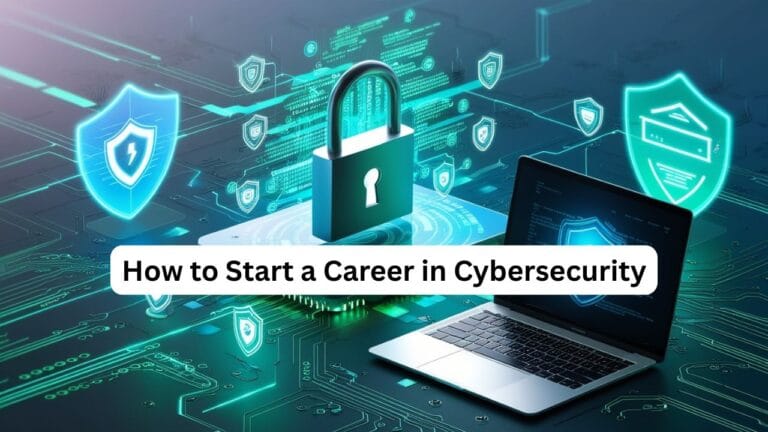Worried about breaking into cybersecurity because you don’t have a tech background? You’re not alone, but here’s the good news: the industry is desperate for diverse talent, and you don’t need a computer science degree to succeed.
Cybersecurity is no longer a niche field, it’s a global necessity. With cyber threats escalating in complexity and frequency, organizations worldwide are in dire need of skilled professionals to safeguard their digital assets. According to the U.S. Bureau of Labor Statistics, information security analyst roles are projected to grow by 31.6% from 2022 to 2032, significantly outpacing the average for all occupations .Research.com
In 2025, the cybersecurity landscape is more dynamic than ever. Emerging technologies, such as artificial intelligence and the Internet of Things, have expanded the attack surface, necessitating a new generation of cybersecurity experts. Whether you’re a recent graduate, a career changer, or someone with a passion for technology, there’s never been a better time to embark on a cybersecurity career.
Cybersecurity isn’t just for hackers in hoodies, it’s a booming field with 3.5 million unfilled jobs globally (ISC² 2024) and salaries averaging $120,000+ for entry-level roles. Whether you’re a teacher, accountant, or recent grad, this guide will show you exactly how to land your first cybersecurity job in 2025, even with zero experience.
“I Don’t Have a Tech Background, Can I Really Do This?” Here’s What’s Really Happening
The biggest myth about cybersecurity? That you need to be a coding genius to start.
The truth? Problem-solving and curiosity matter more than technical skills early on.
Most beginners panic when they see job listings demanding programming languages and certifications. But here’s what hiring managers actually want:
- Adaptability (Can you learn quickly?)
- Analytical thinking (Do you ask “why” when something seems off?)
- Communication skills (Can you explain risks to non-tech people?)
Real-World Example:
Sarah, a former nurse, thought she’d never break into cybersecurity because she didn’t know Python. But her healthcare background gave her a unique edge, she understood patient data privacy laws better than most IT pros. Within 6 months of targeted upskilling, she landed a HIPAA compliance analyst role at a hospital.
The Hidden Factor Everyone Overlooks: Your “Unrelated” Experience Is an Asset
Your past jobs might be your biggest cybersecurity advantage.
A 2024 SANS Institute study found that 42% of hiring managers prefer career-changers because they bring fresh perspectives to threat detection.
How to Repurpose Your Background:
| Former Career | Cybersecurity Strength | Best Entry-Level Role |
| Customer Service | Spotting social engineering scams | Security Awareness Trainer |
| Teacher | Breaking down complex concepts | GRC (Governance, Risk, Compliance) Analyst |
| Journalist | Investigating patterns | Threat Intelligence Analyst |
Actionable Tip:
- List 3 skills from your current/most recent job.
- Match them to cybersecurity soft skills (e.g., “negotiation” → “stakeholder risk communication”).
“Get Certifications First” Debunked: Why This Advice Backfires
Certifications alone won’t get you hired, but projects will.
Employers increasingly prioritize hands-on proof over paper credentials (CompTIA 2025 Trends Report).
Traditional Path vs. Smart 2025 Approach
| Old Advice | Better Strategy |
| “Get a CompTIA Security+ before applying” | Build a home lab (e.g., detect mock malware in a free AWS sandbox) |
| “Learn every programming language” | Master one scripting tool (Python for automation OR PowerShell for Windows security) |
| “Spend $1,000 on courses” | Use free resources (TryHackMe, Hack The Box, Google Cybersecurity Certificate) |
Visual Cue:
Imagine your resume as a movie trailer, certifications are the boring credits, but projects are the action scenes that make recruiters say, “We need this person!”
Step-by-Step Career Launch Plan: Land an Entry-Level Job in 6 – 12 Months
Phase 1: Explore (Weeks 1 – 4)
- Free training: Complete Google’s Cybersecurity Certificate (60% finish in under 3 weeks).
Phase 2: Build Proof (Months 2 – 6)
- Project idea: Set up a SIEM tool (Splunk free tier) to monitor your home network.
- Networking: Join OWASP local chapters (find meetups on Meetup.com).
Phase 3: Job Hunt (Months 6 – 12)
- Resume hack: Use “Before-After-Impact” bullet points:
*“Migrated 50+ employees to MFA → Reduced phishing breach risk by 70% (verified in home lab report)”* - Apply smart: Target tier 2 help desk and SOC analyst roles, they’re the #1 gateways to cybersecurity (Burning Glass 2024 data).
Insider Hiring Secrets (From a Recruiter’s 2025 Playbook)
What hiring managers really look for in interviews:
- “Tell me about a time you failed” → They want growth mindset examples.
- Bad answer: “I don’t make mistakes.”
- Strong answer: “Once misconfigured a firewall in my lab—documented the fix and shared it on LinkedIn. Got 3 recruiter DMs from that post.”
- “What’s your favorite cyber news story?” → Tests passion for learning.
- Pro tip: Mention a recent CVE (Common Vulnerabilities and Exposures) like the 2025 Microsoft Zero-Day.
Key Takeaways (TL;DR)
- Your non-tech background is an asset, not a weakness (Healthcare? Finance? You’re ahead!).
- Skip certification spam, build 2–3 portfolio projects (Free labs >> $500 exams).
- Break in via “gateway roles” (SOC analyst, GRC, security awareness training).
- Network smarter (70% of jobs come from referrals, comment on #cybersecurity LinkedIn posts daily).
Final Motivation:
Embarking on a cybersecurity career in 2025 is a strategic move into a field that is both challenging and rewarding. By building a strong foundation, obtaining relevant certifications, gaining practical experience, and committing to lifelong learning, you position yourself for success in protecting the digital world.
Remember, the path to cybersecurity is a marathon, not a sprint. Stay curious, stay informed, and stay resilient. Your efforts will contribute to a safer digital landscape for all.
“The best cybersecurity pros aren’t the ones who know everything, they’re the ones who learn everything. You’ve got this.”





